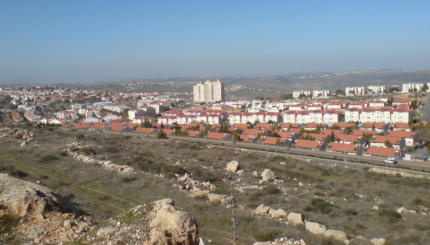Nine months ago I opened the front door of my apartment in Alon Shvut and took a 20-minute walk that began to change my life. My wife asked me to reconsider—it might be dangerous, she said—but I went anyway. My heart beat just a little bit faster than usual as I walked through the Arab fields and vineyards that surround my home in the Judean Hills.
Israeli and Palestinian kids playing together
Just a few days earlier I had sat in my living room with a Protestant pastor from the US who had come to the Holy Land in order to meet Palestinians, meet Israeli settlers, and then introduce them to each other. He listened to my story of biblical Zionism and of passionate connection to the rebuilding of Jewish life in the biblical heartland. He heard of my identification with our forefather Abraham, with Isaac and Jacob and with the whole panorama of Jewish history—and then he invited me to a little gathering on a Palestinian farm plot at where Palestinians and Israeli settlers might be able to begin to get to know each other.
Never before had I met a Palestinian as an equal, never before had I socialized with one or broken bread with one. I knew nothing about them. We live so close to each other, and yet we are so far apart.
For us the Palestinians are the consummate other. The other that you ignore, that you never see. The other that you would never give a ride to, the other that you would never invite into your home. The other from whom you are completely distant, the other of whom you are thoroughly suspicious.
For 3 hours or more I chatted with them and ate with them. I looked into their faces from up close, and saw—despite my prejudices—human faces. And I heard stories that were so different from my stories, stories that created strange unfamiliar narratives from the same building blocks as my own narrative, but which I could not reject out of hand. The stories I heard—of deep connection to the land, of exile, of suffering, of humiliation, of loved one lost in the conflict—were authentic and they were real. Never before had I heard such stories. And they affected me deeply.
One Palestinian man—who turned out to be a very close neighbor, except that a very high chain link fence separates between our homes—told me of the fear evoked in the hearts of his children when they saw a settler with a big kipa and long beard like mine. I didn’t get it, until he explained that the kipa and beard were often accompanied by a rifle. And then I began to understand. I blurted out to him, “You say that you are afraid of us? No, we are afraid of you!”
As it began to get dark and there were about 25 or 30 of us left, we sat around in a circle and heard the life story of Ali Abu Awwad, former militant turned nonviolent peace activist. He spoke of nocturnal raids by the Israeli military, of rights denied, of prison. And I knew it was true. I had suppressed my memories of participating in those raids and guarding those prisoners decades ago as a young soldier—and it all came back to me, flooding my consciousness.
Ali’s reality made its way into my heart … and I will never be the same. His truth has not made mine any less true, rather it has shown my truth to be only part of the complex web of the reality in which we live. My life has become so much more complicated as I hold within my consciousness two conflicting truths that are both valid. Loose ends are dangling within me. I have become much more fragmented yet much more whole. As I embrace more and more partial truths, my horizons expand in the direction of the Infinite One, within Whom all truths find their proper place.
These days leading up to are days of teshuva—soul searching and penitence. May my teshuva this year—the most intense and the most paradigm-shattering I have ever experienced—be acceptable before God.
Postscript – The events described above gave birth to Roots/Shorashim/Judur – The Israeli Palestinian Initiative for Grassroots Understanding, Nonviolence and Transformation. For more information, go to www.friendsofroots.net
Moved by this post? Join the conversation through MyJewishLearning’s weekly blogs newsletter.


